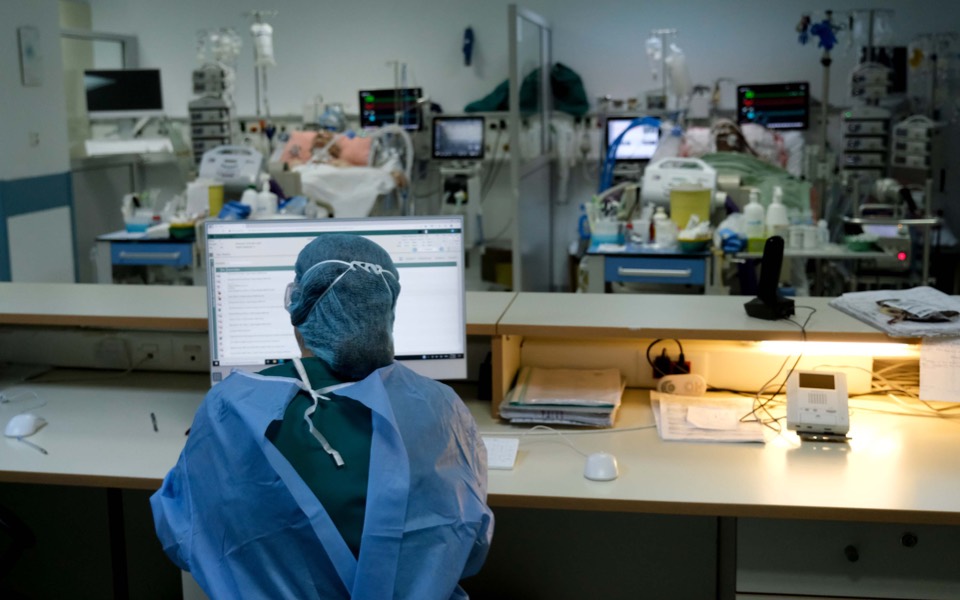ESY faces Covid bill of 3.2 bln euros

The cost of the Covid-19 pandemic on Greece’s National Health System (ESY) can be estimated at around 3.2 billion euros, judging by the findings of a recent report, some official data and inferences from different sources, in the absence of complete figures from a single official source on this issue.
This price tag includes hospitals’ payroll costs and investments and modifications made in response to the health crisis. It does not include donations made for PPE and intensive care unit beds and machines.
In one recent report presented at a medical conference in Athens last week, the authors – Kostas Athanasakis, an assistant professor in public health policy at West Attica University, and Kyriakos Souliotis, a professor of health policy at the University of the Peloponnese – made an initial estimate of the cost of Covid-19 on ESY during the period from March 14, 2020 to April 4 this year at €633 million. However, Athanasakis noted that this estimate does not include expenses for investments, protective equipment and vaccines, nor indirect costs, meaning expenses arising from the modification of general public hospitals into coronavirus referral facilities or from the cessation of all other activities not related to Covid.
According to Finance Ministry data, the 2020 budget for the Health Ministry of €3.86 billion had to be bolstered with additional funds from the reserves of €970 million, or nearly €1 billion in response to the coronavirus crisis. Having seen the cost of the first and second waves, the government increased the Health Ministry’s budget for 2021 to €4.26 billion, but developments during the third and fourth waves led to additional needs of €960 million, bringing the overall budget for this year to €5.22 billion.
Basically, the budget for the National Health System had been calculated for 2021 at €3.86 billion and is now at €5.22 billion, meaning roughly €1.5 billion more. The cost of €280 million for the purchase of coronavirus vaccines also needs to be added to this.
As far as investments in new facilities/equipment or modifications and expenses for protective equipment are concerned, estimating costs becomes a lot trickier because of the private donations made in both areas. According to some estimates, ESY has received donations of more than €180 million (€100 million of which was from the Stavros Niarchos Foundation alone) since the start of the pandemic. The bulk of that, €110 million, was during the first wave, while the SNF money was used to create more ICUs at many hospitals and improve oxygen delivery to patient beds.
Cost of care
How much does it cost to treat a Covid-19 patient on a ventilator? In Germany, which has the highest number of ICUs in Europe, the cost of treatment for one Covid patient in intensive care comes to around €34,000 on average. Outside intensive care, this drops to €5,800 per hospital stay. When the patient needs extracorporeal life support (ECMO), however, that figure shoots up to €92,000. During the first year of the pandemic, the German Health Ministry estimated that the cost of each Covid-19 patient ranged from €18,100 to €145,000, depending on the severity of the illness.
Estimating the cost of care for Covid-19 patients in Greece – in regular and ICU wards – is impossible. In fact, public hospitals didn’t even have individual budgets until recently, and some still don’t. Conclusions can only be drawn by inference. For example, EOPYY, the country’s biggest health insurance fund, pays hospitals €800 per patient per day for critical care in ICUs. This does not include pay for the doctors, nurses and other staff attending to the patients.
In their study, Athanasakis and Souliotis estimate the cost of treating a Covid patient in intensive care at more than €2,000 a day, and in a regular ward at €450 a day. However, because Covid is a disease that requires a lot of hands-on, around-the-clock care by numerous medics and nurses, stringent sanitation and large quantities of PPE, the cost of labor and materials is a significant parameter. In the Health Ministry’s budget, hospital payroll costs account for 60% of the total.
“According to some calculations, without the modifications at hospitals, but including the cost of medicines, salaries and overtime – and noting that not all ESY hospitals’ staff were involved in Covid care – the cost [of Covid] comes to at least €500-600 million a year,” a Health Ministry official who declined to be named told Kathimerini.
This means an increase in overall costs of more than €3 billion for the period from March 2020 to the present. This, moreover, does not include the cost of salaries for medics working at vaccination centers or for diagnostic tests.
The cost of some services, meanwhile, has been woefully undercalculated. For example, when the Greek DRG Institute, which is responsible for calculating the cost of medical services, recommended that €50 be added to the cost of cleaning and sanitizing Covid wards – the cost is actually much higher than that – the ministry refused because it thought it unnecessary. Last year, the ministry used a private clinic in Athens to treat Covid patients with mild symptoms, calculating the cost of their care at just €1,000 a week. The management of that clinic is still locked in a battle with EOPYY because that falls far short of the actual expense it incurred.
So, all together, from March 2020 to the present, the overall cost of Covid on ESY can be estimated at around €3.2 billion, by adding the €1 billion earmarked by the Health Ministry, the €1.9 billion in extraordinary funding drawn from the reserves and the €280 million spent on vaccines.





